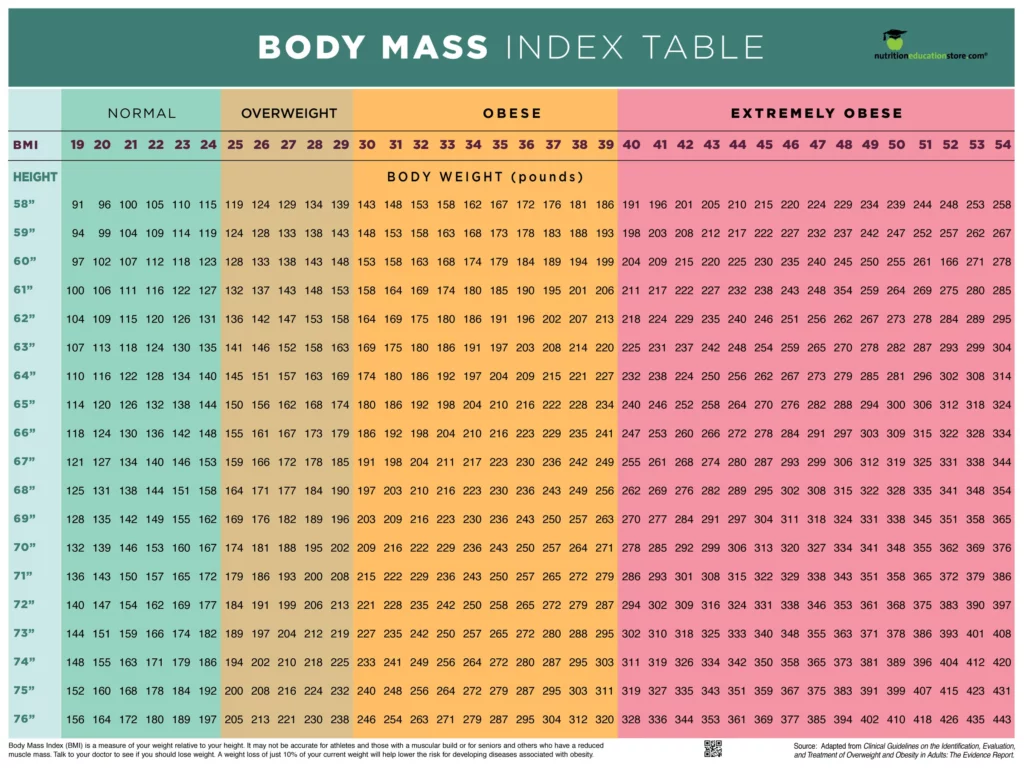Being 17 is hard enough without having to worry about your weight. Whether you’re trying to lose weight, gain weight, or maintain your current weight, it’s important to know what a healthy weight is for your age and height.
In this article, we’ll break down what a healthy weight is for 17-year-olds and how you can achieve and maintain it.
What is a Healthy Weight for a 17-Year-Old?
The Centers for Disease Control and Prevention (CDC) recommends that teenagers aged 13 to 18 years old maintain a BMI (body mass index) within the 5th to 85th percentile range for their age and gender.
BMI is calculated using your height and weight and gives you an idea of whether you are underweight, overweight, or have a healthy weight. To calculate your BMI, use this formula: BMI = (weight in pounds x 703) / (height in inches)².
You can also reference this chart to get a feel for what weights are appropriate for various heights.
The chart is valid for both boys/men and girls/women.

What is Overweight for a 17-Year-Old?
Overweight is considered a BMI of above 25, while obese is considered a BMI of above 30.
If your BMI is above these ranges, you may be at an increased risk for developing obesity-related health problems such as heart disease, stroke, type 2 diabetes, and certain types of cancer.
That doesn’t mean that you will definitely develop these diseases if you are overweight or obese, but it’s important to be aware of the risks.
What Should I Do if I Think I (or My Child) Is Overweight?
If you’re concerned about weight putting one’s health at risk, talk to your doctor or a registered dietitian. They can help you develop a healthy eating plan and an exercise routine that’s best.
They can also provide support and guidance as you work to reach a healthy weight.
How Can I Maintain a Healthy Weight?
There are a few things you can do to help ensure that you maintain a healthy weight:
Eat a variety of nutrient-dense foods
Focus on fruits, vegetables, whole grains, lean proteins, and low-fat dairy.
Limit processed and sugary foods
These foods are often high in calories but low in nutrients.
Get regular physical activity
Aim for at least 30 minutes of moderate-intensity physical activity most days of the week. brisk walking, biking, swimming, and dancing are all great options.
Manage stress in healthy ways
Chronic stress can lead to overeating and weight gain. Find healthy ways to manage your stress, such as exercise, journaling, or spending time with friends or family.
If you’re struggling to maintain a healthy weight, talk to your doctor or a registered dietitian. They can help you develop a plan to reach and maintain a healthy weight that’s right for you.
Get quality sleep
Aim for 7-9 hours of sleep each night. Sleep deprivation can lead to weight gain and other health problems.
What if I’m Underweight?
Underweight is considered a BMI below the 5th percentile range. If you are underweight, you may be at risk for developing health problems such as nutrient deficiencies, osteoporosis, and infertility.
If you’re concerned about being underweight, talk to your doctor or a registered dietitian. They can help you develop a plan to reach and maintain a healthy weight that’s right for you.
How Much Should You Weigh For Your Height, Gender, And Body Frame Size?
FAQs – Normal Weight for a 17-Year-Old
How to Achieve and Maintain a Healthy Weight for a 17-Year-Old?
There are many things you can do to achieve and maintain a healthy weight.
Start by making sure you’re eating a balanced diet with plenty of fruits, vegetables, whole grains, low-fat dairy, and lean protein. Also, make sure you’re getting enough fiber every day.
Fiber is a nutrient found in plant-based foods that helps keep you feeling full and can help reduce your risk of obesity.
In addition to eating a healthy diet, make sure you’re getting regular physical activity. Aim for at least 30 minutes of moderate-intensity exercise most days of the week. This can include things like brisk walking, biking, swimming, or dancing.
Also, make sure you’re managing stress in healthy ways and getting quality sleep every night.
If you’re struggling to maintain a healthy weight, talk to your doctor or a registered dietitian. They can help you develop a plan to reach and maintain a healthy weight that’s right for you.
What Are the Health Risks of Being Overweight or Obese for a 17-Year-Old?
If you are overweight or obese, you may be at an increased risk for developing obesity-related health problems such as heart disease, stroke, type 2 diabetes, and certain types of cancer.
That doesn’t mean that you will definitely develop these diseases if you are overweight or obese, but it’s important to be aware of the risks.
If you’re concerned about weight putting your health at risk, talk to your doctor or a registered dietitian. They can help you develop a healthy eating plan and an exercise routine that’s best.
They can also provide support and guidance as you work to reach a healthy weight.
How Many Calories for a 17-year-old?
The number of calories you need each day depends on your age, gender, height, weight, and physical activity level.
Most 17-year-olds need between 1,800 and 2,800 calories a day.
If you are very active or you are trying to gain weight, you may need more calories. If you are trying to lose weight, you may need fewer calories.
Talk to your doctor or a registered dietitian if you’re not sure how many calories you need each day. They can help you create a healthy eating plan that’s right for you.
Conclusion – Normal Weight for a 17-Year-Old
Maintaining a healthy weight is important for overall health at any age, but it’s especially important during the teenage years.
Achieving and maintaining a healthy weight as a teenager is important for your overall health and well-being.
By following the tips outlined in this blog post, you can make sure that you’re at a healthy weight for your age and height.
If you need help making changes to your diet or lifestyle, don’t hesitate to work with a doctor or registered dietitian.
Related
- Normal Weight for a 13-Year-Old
- Normal Weight for a 14-Year-Old
- Normal Weight for a 15-Year-Old
- Normal Weight for a 16-Year-Old


